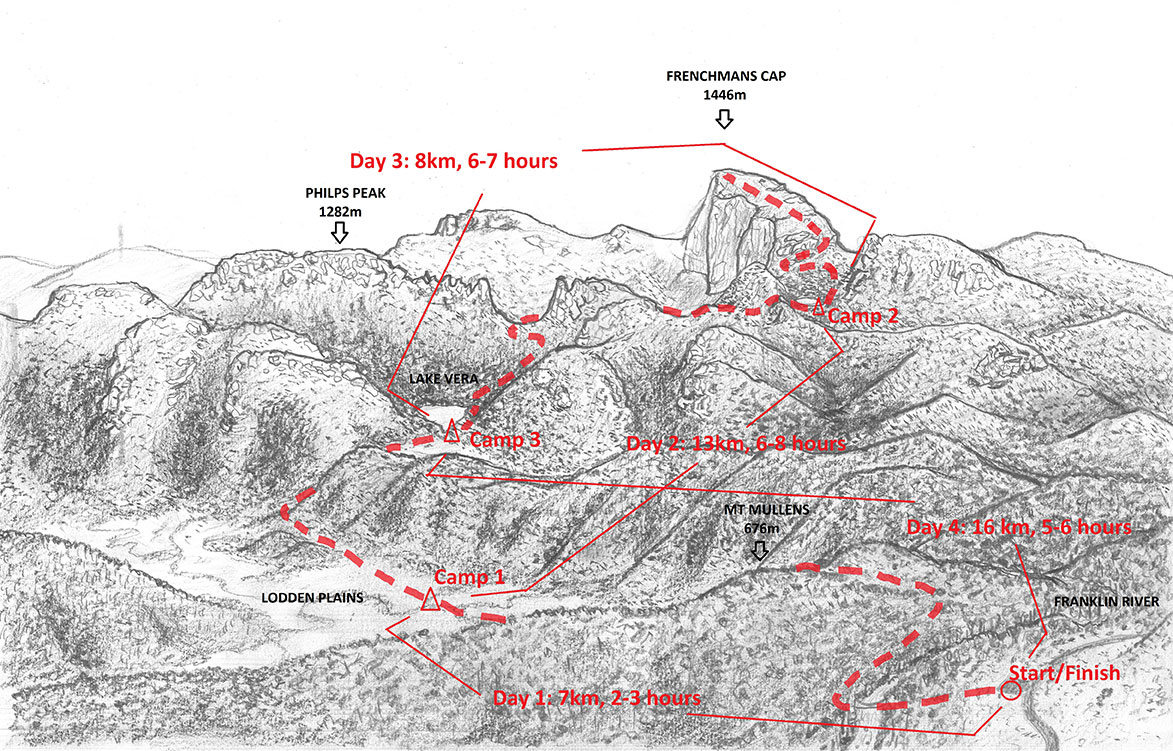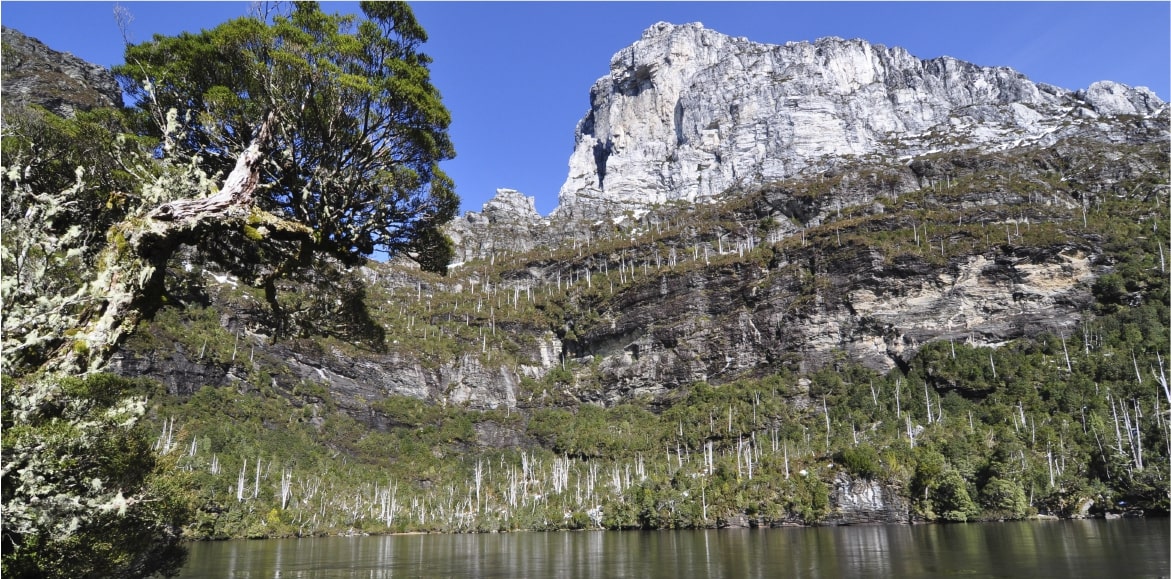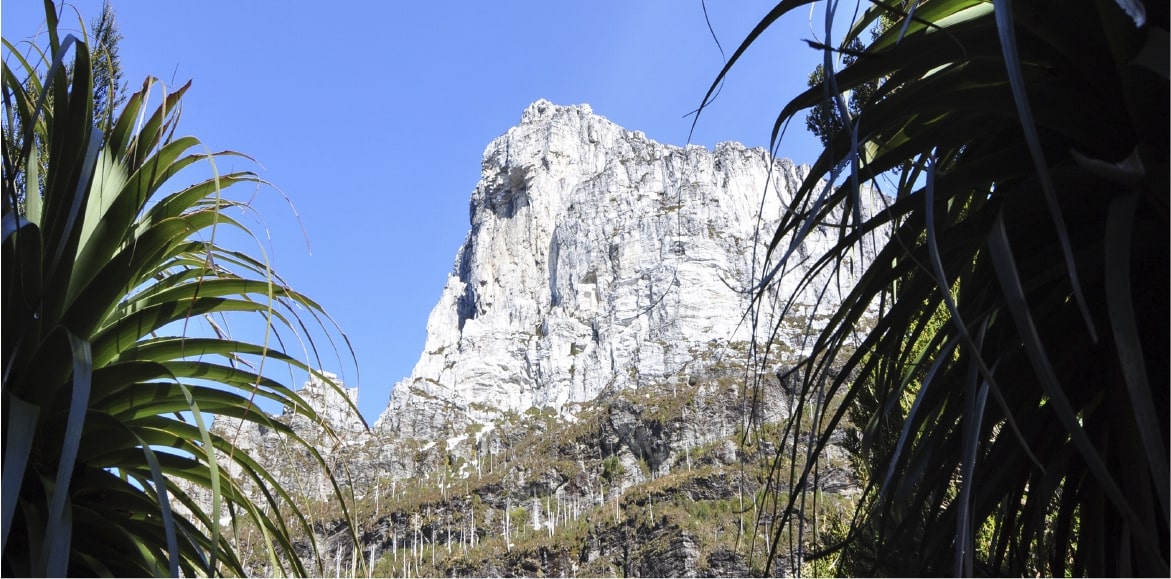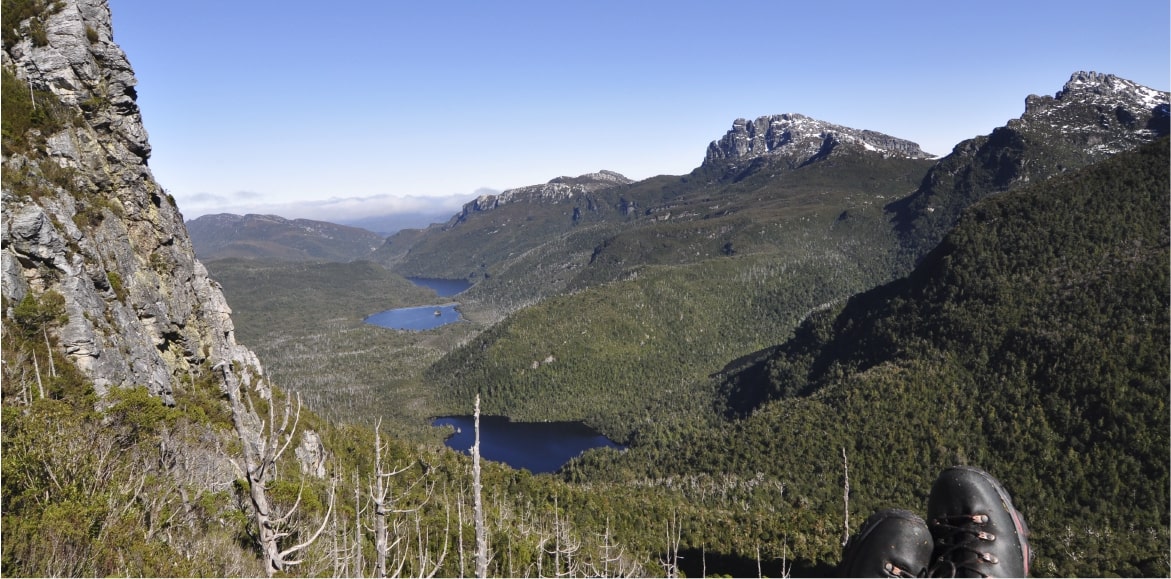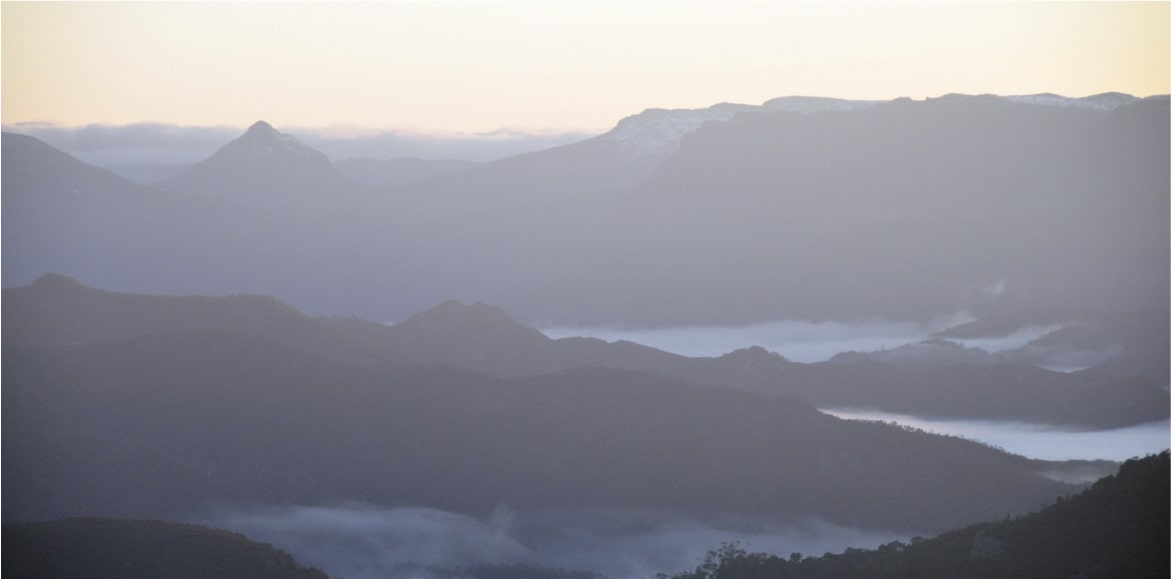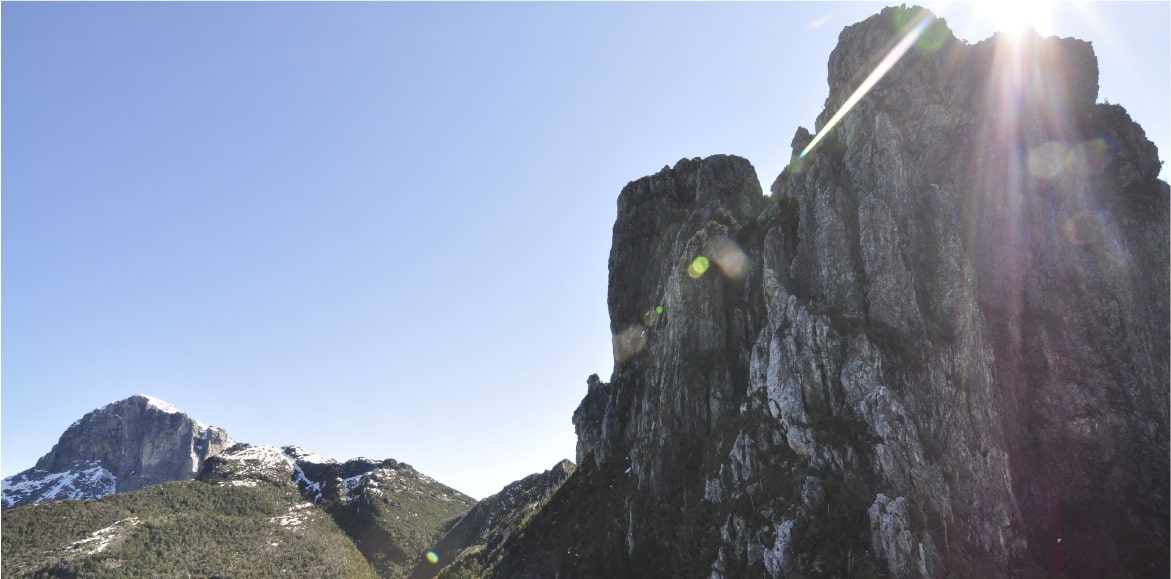Overview
Walk Grade: Moderate/Hard
Our guided 4-day itinerary showcases one of Tasmania’s more challenging (and rewarding) bushwalking experiences.
Sentinel of Tasmania’s south west wilderness, Frenchmans Cap dominates a wild landscape of pristine lakes and impossibly jagged peaks. At 1446m ‘The Cap’ towers above the iconic Franklin River (crossed on the first/last day) and offers up extensive views of some of Tasmania’s most remote wilderness. In itself, with its quartzite bulk and sheer eastern face it is quite simply, awesome!
‘Frenchmans’ is a journey with a destination, where the rewards are well worth the effort. We take four days to best appreciate the area, attempt a climb to the mountain summit (weather dependent) and explore the surrounding ridges and lakes. The 46km track does represent more of a physical challenge with it’s rough terrain and long, steep climbs.
Pick-Up/Drop off is from Hobart.
2025-26 Departures:
- November 4th -7th 2025
- November 20th – 23rd 2025
- December 12th – 15th 2025
- January 29th – February 1st 2026
- March 12th -15th 2026
Map Sheet Tasmap 1:50000 ‘Frenchmans Cap Map And Notes’
South West Tasmania – John Chapman
Frenchmans Cap – Story of a Mountain – Simon Kleinig
DAY ONE
Distance: 7 km
Estimated Time: 2.5 – 3 Hours
Following outfitting at Hobart we transfer to the trail-head off the Lyell Highway around a half hour west of St Clair. We will have lunch along the way. We cross the Franklin River (suspension bridge) and make our way over the Franklin Hills and down onto the Loddon Plains. Depending on progress we choose one of several campsites for the first evening.
Day Two
Distance: 13km
Estimated Time: 6-8 Hours
The previous afternoon has set us up for an early crossing of the Loddon Plains and after a short climb we will arrive at Lake Vera in time for lunch. From there, the track gets a little wilder as we traverse the rainforest around the lake and then climb steeply under towering quartzite spires to Barron’s Pass and our first close up view of Frenchman’s Cap. Rugged terrain and slow progress follows as we sidle under Sharlands Peak and gradually make our way to Tahune Hut.
Day Three
Distance: 8 km
Estimated Time: 6-7 hours
If the weather cooperates we will have a chance to climb to the summit of Frenchman’s Cap! The long, steep ascent winds it’s way through several cliff bands with short sections of scrambling before topping out on the summit, right on the edge of one of the largest cliff faces in Australia! After descending, we will put on our full packs and retrace yesterday’s route back to Lake Vera where we will spend the night.
Day Four
Distance: 16 km
Estimated Time: 5-6 hours
The final day will be a long, but comparatively easy walk back across the Loddon Plains and over Mt Mullens.
Our listed tour prices includes:
- Pre-trip planning and advice.
- Transport to/from the trail head from Hobart.
- Comprehensive equipment – High quality gear that will keep you safe in all conditions. You’ll need to bring footwear and some personal clothing (socks, underwear, baselayers and a fleece).
- All permits and insurances as required (we recommend you also obtain some form of additional personal travel/property insurance).
- All meals provided and prepared for the duration of the tour.
- Experienced guides who will carry all meals, group equipment, safety equipment and communications.
For our guided walks the majority of your gear is provided as part of the tour cost. We do this to ensure everyone is properly outfitted to a similar standard.
Our gear selection has been finetuned through decades of experience and experimentation in Tasmanian conditions. We use high-end, lightweight products that strike the perfect balance between weight, functionality and comfort.
A 9-10kg pack weight (without water) is achievable by sticking closely to our recommended gear list. You are welcome to bring your own alternative equipment and discuss its suitability with our guides. It is advisable to bring any extra personal items you are unsure taking, as we can store unwanted items until the end of the trip.
Gear Provided
- Tent (twin- share or single)
- Groundsheet
- Backpack (50L -internal frame pack and liner bag)
- Mattress (insulated/inflatable)
- Sleeping Quilt (-9c, high-loft down, water repellent.
- Sleeping bag liner (silk)
- Waterproof Jacket (Goretex or Event jacket with hood)
- Waterproof over-pants
- Head-torch (Small LED headband torch & attached whistle)
- Water bottle (1L).
- Meal kit (bowl/plate/mug/spork).
- Toilet roll & hand sanitiser.
- Microfibre towel
- Insulated jacket (or your own equivalent, preferably down or synthetic insulation)
- Fleece mittens
Optional Gear Provided:
These are included in the tour price
- Gaiters (nylon boot & sock covers)
- Day pack (lightweight / ultra-packable 20L backpack for optional side-trips)
- Crocs (camp shoes)
- Wash basin (personal basin to collect water for washing)
- Walking Poles (recommended if you have any former lower leg or balance issues)
Personal Items:
- Walking boots/shoes (these should be comfortably worn in, but not so old that glue failure is a risk. Low cut shoes are acceptable for those used to bushwalking in them, however they may not be compatible with gaiters.)
- Long pants or shorts (synthetic fibers are best, NOT COTTON as it is slow to dry and saps warmth)
- Underwear
- Thermal top and bottoms
- Shirt for walking (synthetic or wool, NOT COTTON as it is slow to dry and saps warmth)
- Light fleece or wool jacket (for walking on colder days)
- Socks- 2-3 pairs (NOT COTTON, one pair to be kept dry for evenings)
- Sun hat
- Beanie
- Toiletries (please do not bring soap)
- Toothbrush and toothpaste
- A small tube of sunscreen
- Personal medications/sanitary items*
*Please bring personal pain relief. Also consider personal antihistamines, diarrhea medications and re-hydration salts (in addition to more specific personal medications). Guides carry bandages, tapes and dressings as well as some emergency medications.
Most Tasmanian walkers and don’t use water purification products, as water sources in wilderness areas are generally safe. However you are welcome to bring them for peace of mind (tablets will suffice).
Frenchmans Cap is a challenging walk. It is substantially harder than the Overland Track, due to the rugged terrain that is encountered. While the distances are relatively small, the days are long and exhausting due to the relentless climbs and multiple sections of steep, awkward scrambling through tangled rainforest and exposed rock sections.
No rock-climbing experience is necessary, however participants must be comfortable with heights and confident on terrain that requires the use of hands.
This walk is generally recommended for those who are fit and have some experience with multi-day walking. It is only suitable for first time walkers if they are exceptionally fit and adventurous.
Wilderness Expeditions considers Frenchmans Cap as Moderate/Hard, as some of the days border on the “hard” classification in terms of ruggedness.
Moderate
Moderate walks are on tracks that are rougher underfoot and require bigger days. Roots, broken rocks and shallow mud will be encountered, and walkers will need to move slowly and carefully. There will be more time spent walking each day (6 hours or more) and longer distances will be covered (above 15 km). Elevation gain will be greater (more than 400m) and there may be sustained, steeper sections where hands are needed for balance. There may be exposed sections of track where the full force of bad weather will be felt. These walks are suitable for adventurous first-time walkers with a moderate level of fitness.
Hard
Hard walks are on very rough tracks that involve deep mud, overgrown vegetation and steep, difficult terrain. Longer days (8 hours or more) will be required to cover the minimum distances between campsites and the pace will be a little faster out of necessity. Significant elevation gain (up to 1000m) may be necessary and steep sections can be long and relentless. No climbing experience is necessary, but walkers must be comfortable scrambling over rough terrain with some exposure. On walks of this difficulty, walkers may be required to carry a small portion of the food, resulting in heavier packs. Hard walks are only suitable for those with good fitness and previous bushwalking experience.


